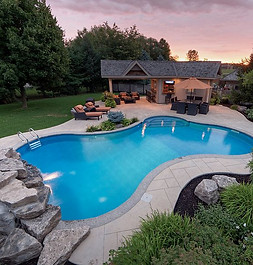Serene Pool Guide
Fiberglass, vinyl, and concrete pools each have unique advantages. We hope this guide helps you compare your options and find the best fit for your budget and backyard.
Please contact us if you have any questions.



Fiberglass
Pre-manufactured, single-piece shells that are delivered to your site and installed in a prepared hole.
Pros:
-
Quick Installation: Fiberglass pools can be installed within 1-3 weeks, which is significantly faster than vinyl or concrete.
-
Low Maintenance: The non-porous surface resists algae growth, making it easier to clean and maintain compared to concrete.
-
Durability: Fiberglass pools are long-lasting and are resistant to cracking or peeling.
-
Smooth Surface: The smooth interior surface is gentle on swimmers’ skin and comfortable to walk on.
Cons:
-
Limited Customization: Since fiberglass pools are pre-made, customization options in terms of shape, size, and features are limited.
-
Higher Upfront Cost: Fiberglass pools can have a higher upfront cost compared to vinyl but less than custom concrete.
-
Transportation and Size Limits: They are limited in size, as they need to be transported to the site.
Vinyl Liner
Vinyl liner pools are built on-site using a flexible liner that fits over a steel or polymer frame.
Pros:
-
Lower Initial Cost: Vinyl liner pools generally have the lowest initial cost of all three options.
-
Custom Shapes and Sizes: Can be customized in terms of shape and size more easily than fiberglass.
-
Smooth Surface: The vinyl liner provides a smooth surface, which is also easy on swimmers' skin.
Cons:
-
Liner Replacement: The vinyl liner typically needs to be replaced every 7-10 years, which can add to the long-term cost.
-
More Vulnerable to Damage: The liner can be punctured or torn by sharp objects, pets, or debris.
-
Higher Maintenance: Vinyl liners are prone to algae growth, which can require more chemical treatments compared to fiberglass.
Custom Concrete
Custom concrete pools are made by spraying a concrete and sand mixture over a steel-reinforced frame, then plastering it.
Pros:
-
Unlimited Design Options: Concrete pools offer the most customization in terms of size, shape, depth, and features like spas, waterfalls, and custom tile.
-
Durability: When well-maintained, concrete pools can last for decades and withstand extreme weather conditions.
-
Luxury Aesthetics: Concrete pools can be designed to look like natural water features or upscale luxury installations, perfect for intricate hardscape integration.
Cons:
-
High Initial Cost: Concrete pools are typically the most expensive to install, both in terms of materials and labor.
-
Long Installation Time: It can take 2-3 months to install a concrete pool due to the complexity of the construction process.
-
Maintenance Intensive: Concrete is porous, making it more prone to algae buildup. It also requires regular brushing and resurfacing every 10-15 years.
-
Rough Surface: The surface of a concrete pool can be rougher on skin and bathing suits than fiberglass or vinyl.






